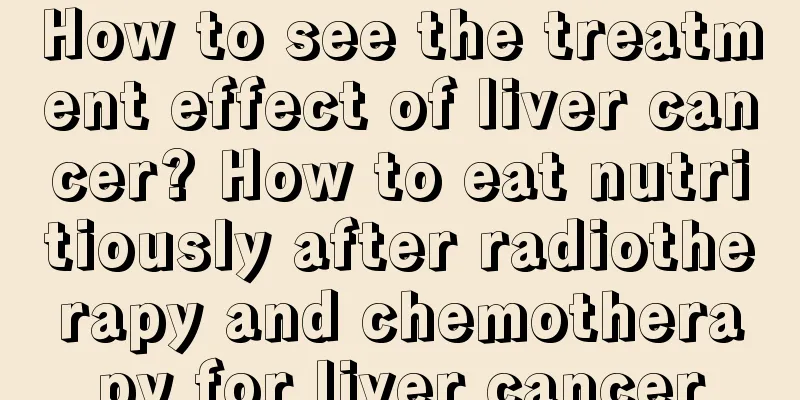How to see the treatment effect of liver cancer? How to eat nutritiously after radiotherapy and chemotherapy for liver cancer

|
In the process of continuous treatment of liver cancer, it is necessary to make certain judgments on the effect of treatment, and the judgment indicators have become the most concerned thing for patients. So, what are the indicators for judging the efficacy of liver cancer treatment? There are two efficacy indicators for liver cancer: one is the survival indicator of liver cancer, and the other is the tumor response indicator. Survival indicators include overall survival rate and tumor-free survival rate. Overall survival rate refers to the survival time of patients or the percentage of patients surviving in a specific time period. Regardless of whether the patient has a tumor or not, as long as they survive, they are calculated into the survival period or survival rate. The tumor-free survival rate refers to the survival period of liver cancer patients in a tumor-free state after surgical resection or the survival rate in a specific time period. Another efficacy indicator for liver cancer is the tumor response indicator, which is mainly used to evaluate the efficacy of non-surgical resection methods. For example, after the application of hepatic artery embolization chemotherapy, whether the tumor shrinks or disappears completely is called complete remission, and the maximum diameter of the tumor shrinks by more than 30% is called partial remission. If the maximum diameter of the tumor shrinks by no more than 30% and increases by no more than 20%, it is called stable. If it increases by more than 20%, or new lesions appear, it is called disease progression. As for the treatment effect of liver cancer, it is currently believed that the most important efficacy indicator is the patient's overall survival, and whether the tumor shrinks is a secondary indicator. Although the patient's tumor has not shrunk, it is in a stable state and the patient may still survive for a long time. Such treatment is still effective; on the contrary, although the tumor has shrunk after some intense anti-tumor treatment, it will soon metastasize to multiple parts of the body or cause the failure of important organs due to the toxic reaction of the treatment. In this case, such treatment is ineffective and undesirable. These are the main indicators for judging the efficacy of liver cancer treatment. In addition, patients should be cared for in terms of diet. So, how should patients with liver cancer be cared for in terms of diet? 1. Comprehensive nutrition and reasonable cooking Nutrition should be comprehensive, cooking should be reasonable, and the diet should be fresh, easy to digest, and rich in nutrition to ensure the patient's heat and nutritional requirements. For example, eggs, fresh fish, lean meat, yogurt, soy milk, etc. can be supplemented; fresh vegetables and fruits can be used to supplement vitamins; at the same time, attention should be paid to choosing appropriate fats to help the absorption of fat-soluble vitamins; auxiliary therapeutic foods such as turtles and mushrooms can also be used. The processing methods of various foods should be paid attention to. Liver cancer patients often have accompanying symptoms such as indigestion and anorexia. Therefore, food is mainly boiled, steamed, and stewed. Try not to eat hard and crisp foods such as fried and deep-fried foods. For liver cancer patients, hard, crisp, and spicy foods can cause serious complications such as gastrointestinal bleeding. 2. Nutrition after surgery, radiotherapy and chemotherapy (1) After surgery, patients should be given a high-protein, high-vitamin diet, such as eggs, pork liver, yellow croaker, sea bass, mandarin fish, pomegranate, banana, carrot, lemon, watermelon, etc. (2) After radiotherapy, it is advisable to eat foods that nourish the body and stimulate the appetite, such as yam, lentils, water chestnuts, pears, winter melon, grapes, wild rice stems, sweet oranges, eggs, quail eggs, and bird's nests. (3) After chemotherapy, it is advisable to eat foods that nourish the qi and spleen, nourish the blood and detoxify, such as stewed soft-shelled turtle, crucian carp, animal liver, goose blood, eggs, winter melon, red dates, coix seed, yam, radish, lotus root, orange, tomato, soybean sprouts, etc. (4) In the late stage of liver cancer, it is advisable to eat light, soft, easy to digest, appetite-stimulating, nutritious foods, such as red beans, yam, coix seed, winter melon, watermelon, crucian carp, carrots, white radish, cucumber, bitter melon, etc. Dietary taboos: 1. Patients with liver depression and spleen deficiency syndrome should avoid eating fatty and sweet foods, such as beef, mutton, dog meat, fatty meat, milk, fried foods, soy products, pumpkin, red dates, peanuts, chestnuts, etc.; spicy foods, such as leek, onion, garlic, chili, pepper, Sichuan pepper, mustard, ginger, etc.; avoid eating cool fruits and vegetables, such as raw cucumbers, raw radishes, raw tomatoes, watermelons, pears, raw water chestnuts, bananas, persimmons, etc.; absolutely avoid drinking all kinds of cold drinks, beer, green tea, and coffee. 2. Patients with damp-heat toxicity syndrome are strictly prohibited from eating warm foods, such as peppers, onions, garlic, ginger, leeks, coriander, pickled mustard, pumpkin, sword beans, cooked peanuts, longans, coconuts, bayberries, lychees, apricots, peaches, cherries, walnuts, pomegranates, etc.; they are prohibited from eating fishy and greasy foods, such as beef, mutton, dog meat, chicken, shrimp, crab, quail meat, snake meat, hairtail, eel, carp, grass carp, silver carp, etc.; they are prohibited from drinking alcohol, and it is not advisable to drink black tea and coffee. 3. Patients with blood stasis and toxic accumulation syndrome should avoid eating fishy and stomach-injurious foods, such as beef, mutton, dog meat, chicken, duck meat, quail meat, pork, goat milk, cheese, turtle, mandarin fish, sea cucumber, crab, clam, conch, jellyfish, scallops, lobster, prawns, river shrimp, river crab, snake meat, etc.; avoid eating pomegranates, persimmons, chestnuts, etc.; absolutely avoid alcohol and strong tea. 4. Patients with liver and kidney yin deficiency syndrome should avoid warm, spicy foods, such as beef, mutton, dog meat, rabbit meat, rooster meat, shrimp, crab, goat milk, cow milk, clams, conchs, oysters, snail meat, black fish, snake meat, leek, garlic, scallion, onion, chili, Sichuan pepper, pepper, cooked peanuts, etc.; avoid or eat less rice vinegar, sugar, grapes, sugar cane, bananas, persimmons, pomegranates, black plums, walnuts, etc.; all kinds of cold drinks, beer, alcohol, strong tea, and coffee are strictly prohibited. |
Recommend
What is the best test for cerebellar atrophy?
We all know that cerebellar atrophy may cause pro...
How long does it take for the pregnancy line to appear
Speaking of the pregnancy line, it must be a situ...
Early symptoms of liver cancer
Liver cancer is a malignant tumor with various ea...
Effective treatment for intestinal tumors
Intestinal tumor is an anorectal disease caused b...
What are the effects of Omega 3
At least 58 kinds of diseases in our body are cau...
Can leukoplakia be cured? How to treat it
White spots are also called vitiligo. It is a rel...
Symptoms of brain metastasis of small cell lung cancer before death? These seven aspects need attention
After small cell lung cancer metastasizes, patien...
How to treat early and middle stage nasopharyngeal carcinoma?
How to treat nasopharyngeal carcinoma in the earl...
Common surgical procedures for treating prostate cancer
Surgery is the primary method of treating prostat...
How often should you take a bath
Taking a bath is a very relaxing thing, so those ...
Is the examination fee for fibroid tumor expensive?
Is the cost of fibroid examination expensive? In ...
Mortality rate of tongue cancer patients
The tongue plays a very important role for humans...
What are the effects and functions of hawthorn?
Hawthorn is a common food in daily life. It has a...
What should I do if the high heels are too small and squeeze my feet?
After women enter society, they have to learn to ...
Successful experience of natural cycle transplantation
Sisters who have always wanted to conceive natura...









